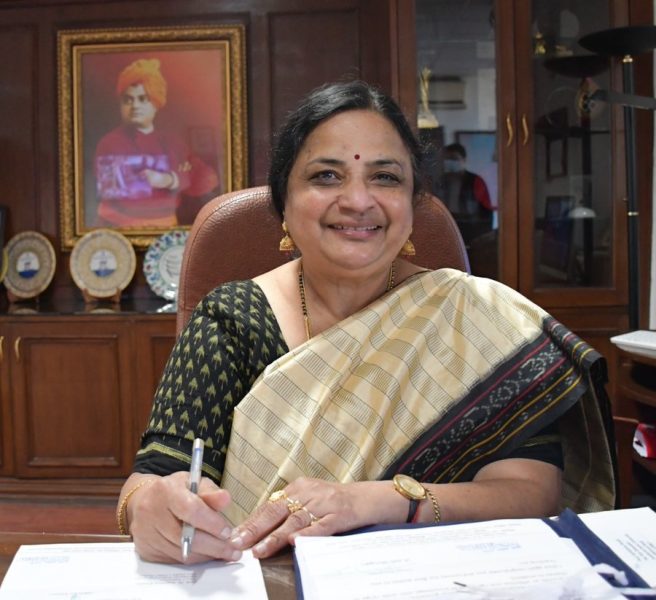
No Hindu god is a brahmin, says JNU V-C; calls Manusmriti regressive on women

Hindu gods do not “anthropologically” come from the upper caste, JNU vice-chancellor Santishree Dhulipudi Pandit said while delivering the keynote address at the B R Ambedkar Lecture Series organised by the Union Ministry of Social Justice and Empowerment.
Speaking at a programme in the national capital, she said that even Lord Shiva could be from scheduled caste or scheduled tribe. Commenting on the recent caste violence over the killing of a nine-year-old Dalit boy in Rajasthan, Santishree Dhulipudi Pandit said that “no god belonged to the upper caste”.
“Most of you should know the origins of our gods anthropologically. No god is a brahmin, the highest is a kshatriya. Lord Shiva must be a scheduled caste or a scheduled tribe because he sits in a cemetery with a snake and has very little clothes to wear. I don’t think Brahmins can sit in the cemetery,” she said.
Also read: JNU to bring back deprivation point model for PhD students: VC Santishree
Tribal roots of Lord Jagannath
Speaking at the lecture series titled ‘Dr B R Ambedkar’s Thoughts on Gender Justice: Decoding the Uniform Civil Code’, the JNU vice chancellor said that “anthropologically” Lord Jagannath has tribal origins.
“Anthropologically” gods, including Lakshmi, Shakti do not come from the upper caste, she further said.
“Unfortunately, there are many people who say caste was not based on birth, but today it is based on birth. If a Brahmin or any other caste is a cobbler, does he immediately become a Dalit? He doesn’t…. I’m saying this because recently in Rajasthan, a young Dalit boy was beaten to death just because he touched the water, didn’t even drink, touched the water of an upper caste. Please understand, this is a question of human rights. How can we treat a fellow human being in such a way?” she said.
‘No women can claim she is a brahmin’
“Let me tell all women that all women according to Manusmriti are shudras, so no woman can claim she is a brahmin or anything else and it is only by marriage that you get the husband or father’s caste on you. I think this is something which is extraordinarily regressive,” she said.
“If you are a woman and you come from the reserved categories, you are doubly marginalised. First, you are marginalised because you are a woman, then you are marginalised because you come from a so-called caste, which is given all kinds of stereotypes,” she added.
‘Buddhism proves dissent is acceptable’
According to her, Buddhism proves the acceptance of dissent in “Indic civilisation”. “I think Buddhism is one of the greatest religions because it proves that the Indic civilisation accepts dissent, diversity and difference. Gautama the Buddha was the first dissenter against what we call Brahminical Hinduism. Please understand he was also the first rationalist in history… we have a tradition revived by Dr Babasaheb Ambedkar,” Pandit said.
The JNU VC opined that Hinduism is not a religion it is a way of life and if it is the way of life then why are we scared of criticism.
Pandit advocated for the implementation of Uniform Civil Code (UCC), saying its implementation across the country would be a tribute towards gender justice in the country. “Goa has a uniform civil code which was imposed by the Portuguese so there also Hindus, Christians and Buddhists and everybody has accepted it, so why is it that it is not being done. Uniformity of laws, their accomplishment as per the Constitution, meant making people progressive and broad-minded to accept the laws put for the society,” she said.
Also read: JNU not against dhabas on campus, but there are rules: VC Santishree
‘Kulpati to Kulguru’
Meanwhile, on the sidelines of the event, she said that JNU may change the reference of vice-chancellor in Hindi from ‘Kulpati’ to ‘Kulguru’. The proposal to change the term to Kulguru was intended to bring in more “gender neutrality,” she said.
“It is due for discussion in the Executive Council on September 14, I will be changing Kulpati to Kulguru. When I came to university everything that was ‘he’, I made that ‘she’. Now ‘she’ is used on all documents. Even when they referred to me, they wrote ‘he’. The idea of Kulpati, I want to call it Kulguru,” she explained.


